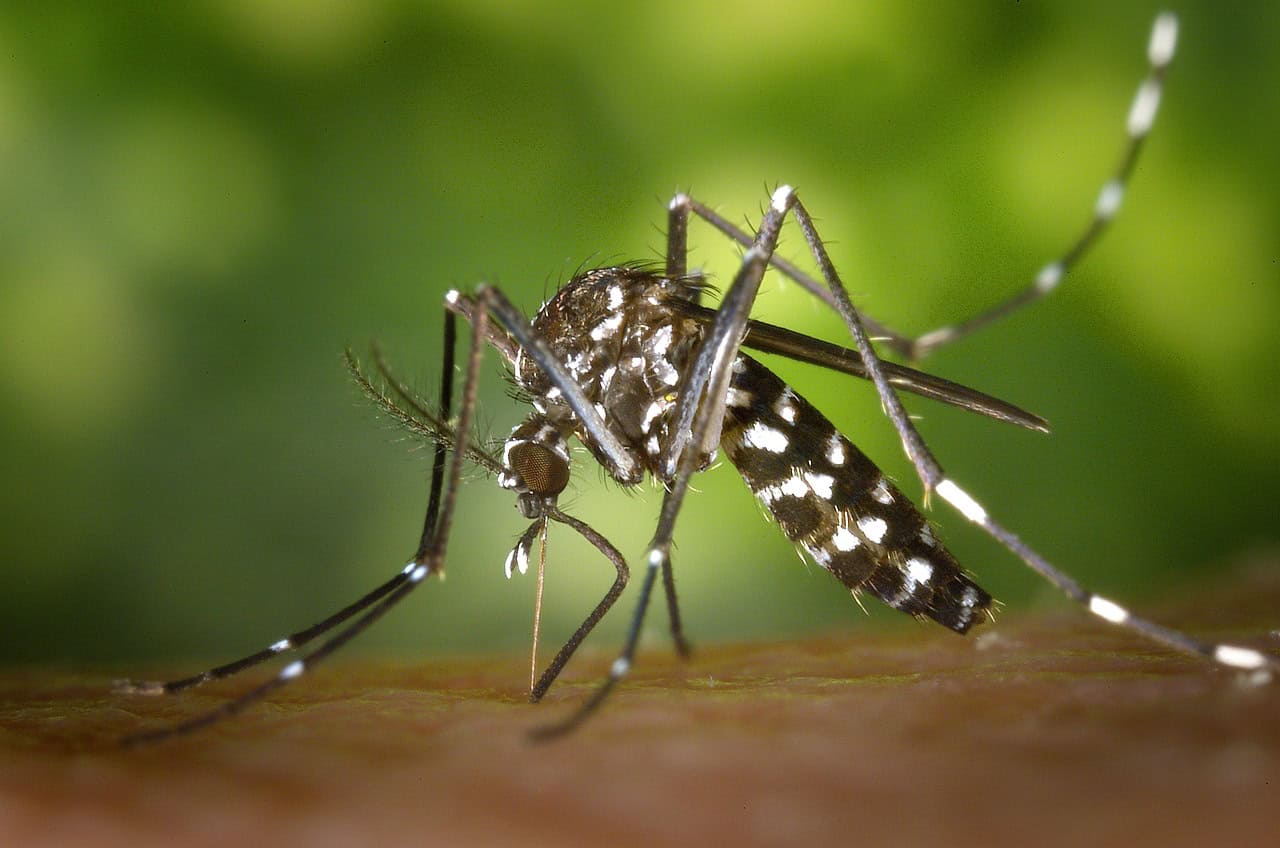Say Goodbye to Mosquito Bites: DIY Repellents That Actually Work
Summertime is for barbecues, picnics, and enjoying the great outdoors. But let’s be honest, those pesky mosquitoes can quickly turn a blissful evening into an itchy nightmare. Luckily, you don’t have to rely on harsh chemical repellents to keep those bloodsuckers at bay. This summer, try these natural and effective DIY solutions to create your own mosquito repellent.
Baking Soda & Vinegar for a DIY Mosquito Repellent
This simple mixture leverages the power of vinegar’s acidic properties and baking soda’s ability to absorb moisture, creating an environment mosquitoes find unpleasant.
What You’ll Need:
1 cup vinegar
1/4 cup baking soda
An empty soda bottle, rinsed and drained
Scissors
Duct tape
Instructions:
Mix it up: Combine the vinegar and baking soda in the soda bottle.
Seal it tight: Cut the top off the bottle and use duct tape to secure a piece of mesh fabric over the opening (this allows for airflow).
Place and enjoy: Strategically place the bottle in areas where mosquitoes tend to congregate, like near your porch or patio.
Note: This method is best used outdoors as the smell of vinegar can be strong indoors.
Lemon Eucalyptus Oil to Get Rid of Mosquitoes
Lemon eucalyptus oil is a natural insect repellent that has been proven effective against mosquitoes. It’s a more potent alternative to DEET and is safe for most people.
What You’ll Need:
Lemon eucalyptus oil
Spray bottle
Water (optional)
Instructions:
Mix and dilute: Combine a few drops of lemon eucalyptus oil with water in a spray bottle (the exact ratio will depend on your preference, but a 1:10 ratio of oil to water is a good starting point).
Spray on skin and clothing: Apply the mixture to your skin and clothing, avoiding sensitive areas like eyes and mouth. Reapply as needed.
Important: Always check the label of the lemon eucalyptus oil you purchase for specific dilution instructions.
Cinnamon Oil
Cinnamon oil is a natural insect repellent that mosquitoes find repulsive. It’s a pleasant alternative to harsh chemicals and can even add a warm, spicy aroma to your outdoor space.
What You’ll Need:
2 teaspoons cinnamon extract
2 ounces of water
Spray bottle
Instructions:
Mix and dilute: Combine the cinnamon extract and water in a spray bottle.
Spray liberally: Spray the mixture around your outdoor area, focusing on areas where mosquitoes tend to congregate.
Note: Cinnamon oil is safe for most people, but it’s always a good idea to test it on a small area of skin first to check for any allergic reactions.
Mouthwash & Salt
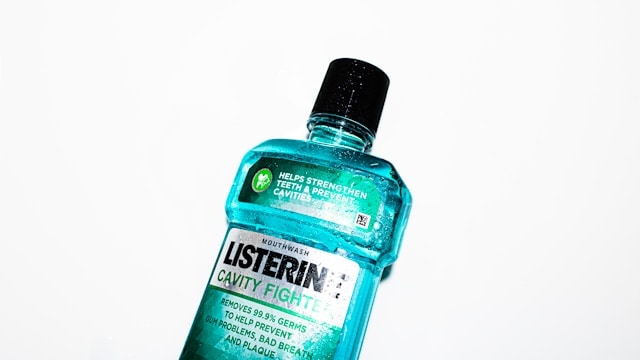
This combination may sound strange, but it’s a time-tested trick for keeping mosquitoes away. The menthol in mouthwash and the salt create an unpleasant environment for mosquitoes, making them less likely to bite.
What You’ll Need:
Large bottle of Mint Listerine mouthwash
3 cups of salt
Spray bottle
Instructions:
Mix it up: Combine the mouthwash and salt in a spray bottle.
Shake well: Make sure the salt and mouthwash are well mixed before using.
Spray liberally: Apply the mixture to your skin and clothing, avoiding sensitive areas like eyes and mouth.
Note: This mixture may leave a slight sticky residue, so it’s best used on clothing or in areas where you won’t be touching your skin frequently.
Rubbing Alcohol
Rubbing alcohol is a known insect repellent, and when combined with essential oils like lavender, it becomes even more effective. Lavender oil not only repels mosquitoes but also adds a calming scent to your outdoor space.
What You’ll Need:
2 teaspoons of essential oil like lavender oil
1/2 cup of water
1 tablespoon rubbing alcohol
Spray bottle
Instructions:
Combine ingredients: Mix the essential oil, water, and rubbing alcohol in a spray bottle.
Shake well: Ensure the ingredients are thoroughly mixed before using.
Spray liberally: Apply the mixture to your skin and clothing, avoiding sensitive areas like eyes and mouth.
Note: Always dilute essential oils with water or a carrier oil before applying them to your skin.
Lemongrass & Rosemary Oil
This blend combines the fresh, citrusy scent of lemongrass with the earthy aroma of rosemary, creating a powerful mosquito repellent that’s both effective and pleasant.
What You’ll Need:
10 drops rosemary oil
10 drops lemongrass oil
4 ounces jojoba oil
Spray bottle
Instructions:
Mix and dilute: Combine the rosemary oil, lemongrass oil, and jojoba oil in a spray bottle.
Shake well: Make sure the oils are thoroughly mixed before using.
Spray liberally: Apply the mixture to your skin and clothing, avoiding sensitive areas like eyes and mouth.
Note: Jojoba oil is a great carrier oil for essential oils, as it’s lightweight and easily absorbed by the skin.
Tea Tree Oil
Tea tree oil is known for its antibacterial and antifungal properties, but it also happens to be an effective mosquito repellent. Its strong, medicinal scent is unpleasant to mosquitoes, making them less likely to bite.
What You’ll Need:
8 drops tea tree oil
4 ounces coconut oil or olive oil
Squeeze bottle
Instructions:
Mix and dilute: Combine the tea tree oil and coconut oil or olive oil in a squeeze bottle.
Shake well: Ensure the oils are thoroughly mixed before using.
Apply generously: Apply the mixture to your skin and clothing, avoiding sensitive areas like eyes and mouth.
Note: Tea tree oil can be strong, so always dilute it with a carrier oil before applying it to your skin.
Lavender Oil, Vanilla, & Lemon

This delightful blend combines the calming scent of lavender with the sweet aroma of vanilla and the fresh citrusy notes of lemon, creating a mosquito-repelling potion that’s both effective and pleasing to the senses.
What You’ll Need:
10 drops lavender essential oil
3 tbsp. vanilla extract
3 tbsp. fresh lemon juice
1 cup of water
Spray bottle
Instructions:
Mix and dilute: Combine the lavender oil, vanilla extract, lemon juice, and water in a spray bottle.
Shake well: Make sure the ingredients are thoroughly mixed before using.
Spray liberally: Apply the mixture to your skin and clothing, avoiding sensitive areas like eyes and mouth.
Note: This recipe can be adjusted to your liking. Feel free to experiment with the amounts of each ingredient to find your perfect scent combination.
Neem & Coconut Oil
Neem oil is a powerful natural insecticide that’s been used for centuries to repel insects. When combined with the moisturizing properties of coconut oil, it creates a protective barrier against mosquito bites.
What You’ll Need:
20 drops neem oil
2 ounces of coconut oil
Spray bottle
Instructions:
Mix and dilute: Combine the neem oil and coconut oil in a spray bottle.
Shake well: Ensure the oils are thoroughly mixed before using.
Apply liberally: Apply the mixture to your skin and clothing, avoiding sensitive areas like eyes and mouth.
Note: Neem oil can be strong, so always dilute it with a carrier oil like coconut oil before applying it to your skin.
Apple Cider Vinegar
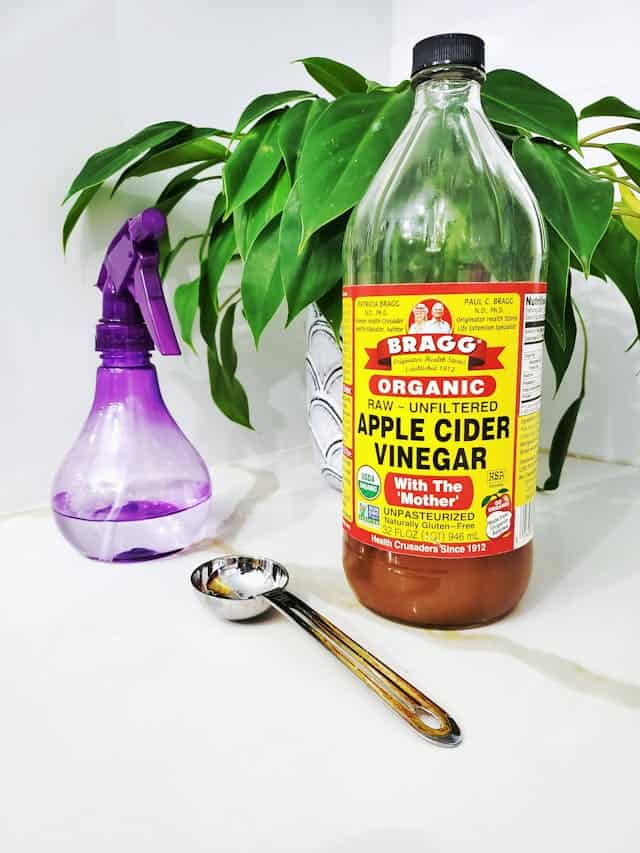
Apple cider vinegar has a unique, pungent scent that mosquitoes find unpleasant. When combined with peppermint oil, it creates a potent repellent that’s both effective and refreshing.
What You’ll Need:
2 ounces apple cider vinegar
1/2 cup of water
10 drops peppermint oil
Bottle with pump
Instructions:
Mix and dilute: Combine the apple cider vinegar, water, and peppermint oil in a bottle with a pump.
Shake well: Ensure the ingredients are thoroughly mixed before using.
Spray liberally: Apply the mixture to your skin and clothing, avoiding sensitive areas like eyes and mouth.
Note: This mixture may leave a slight sticky residue, so it’s best used on clothing or in areas where you won’t be touching your skin frequently.
Strong Mixed Essential Oil Spray
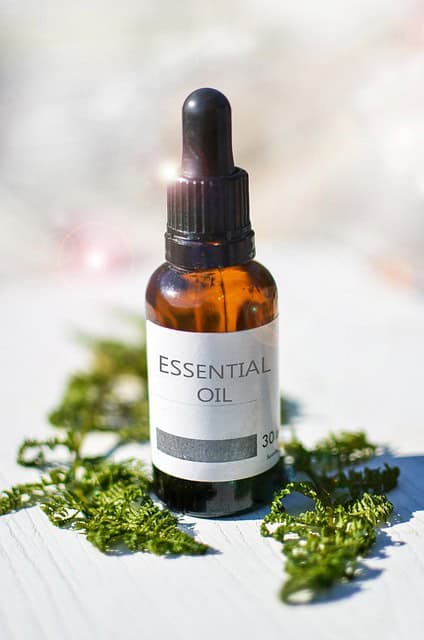
This potent blend of essential oils combines the mosquito-repelling properties of geranium, citronella, eucalyptus, lavender, and rosemary, creating a powerful shield against those pesky insects.
What You’ll Need:
30 drops geranium essential oil
30 drops citronella essential oil
20 drops eucalyptus essential oil
20 drops lavender essential oil
10 drops rosemary essential oil
1 tablespoon vodka
1/2 cup witch hazel
1/2 cup of water
Instructions:
Mix and dilute: Combine all ingredients in a spray bottle.
Shake well: Ensure the ingredients are thoroughly mixed before using.
Spray liberally: Apply the mixture to your skin and clothing, avoiding sensitive areas like eyes and mouth.
Note: This blend is very potent, so it’s important to dilute the essential oils with a carrier like vodka, witch hazel, and water. Always do a patch test before applying to your entire body.
Lavender & Vanilla
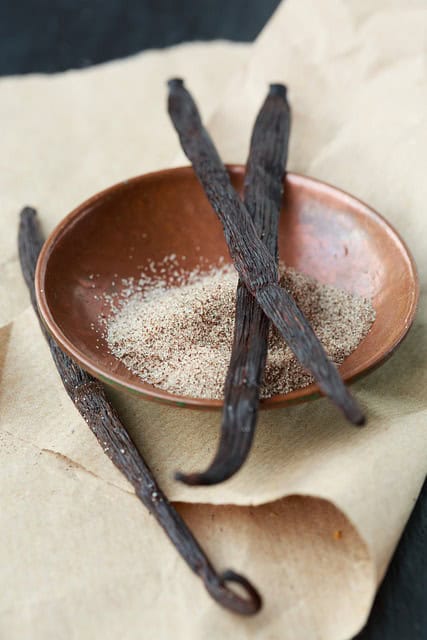
This calming and aromatic blend combines the soothing scent of lavender with the sweet and comforting aroma of vanilla, creating a mosquito repellent that’s as pleasant to smell as it is effective.
What You’ll Need:
15 drops lavender essential oil
4 tablespoons vanilla extract
4 tablespoons lemon juice
Distilled water
Instructions:
Mix and dilute: Combine the lavender oil, vanilla extract, lemon juice, and distilled water in a spray bottle.
Shake well: Ensure the ingredients are thoroughly mixed before using.
Spray liberally: Apply the mixture to your skin and clothing, avoiding sensitive areas like eyes and mouth.
Note: This recipe can be adjusted to your liking. Feel free to experiment with the amounts of each ingredient to find your perfect scent combination.
Essential Oils and Castor Oil Spray
This unique blend combines the power of essential oils with the viscosity of castor oil, creating a long-lasting and effective mosquito repellent.
What You’ll Need:
6 ounces witch hazel
2 ounces castor oil
5 drops cinnamon oil
Instructions:
Mix and dilute: Combine the witch hazel, castor oil, and cinnamon oil in a spray bottle.
Shake well: Ensure the ingredients are thoroughly mixed before using.
Spray liberally: Apply the mixture to your skin and clothing, avoiding sensitive areas like eyes and mouth.
Note: Castor oil is thick and can be sticky, so it’s best applied to clothing or in areas where you won’t be touching your skin frequently.
Fresh Herb Repellent
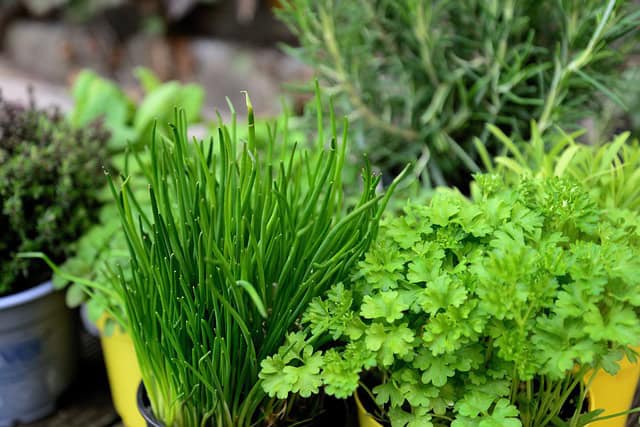
This powerful blend of fresh herbs harnesses the natural insect-repelling properties of lavender, rosemary, mint, sage, marjoram, anise hyssop, and garlic, creating a potent and aromatic repellent that’s sure to keep those pesky mosquitoes at bay.
What You’ll Need:
1 tablespoon lavender flowers
2 tablespoons rosemary
2 tablespoons mint leaves
2 tablespoons sage
2 tablespoons marjoram
2 tablespoons anise hyssop
4 cloves garlic
1-quart apple cider vinegar
Instructions:
Combine the herbs: Chop the herbs finely and combine them in a bowl.
Add the garlic: Mince the garlic cloves and add them to the bowl with the herbs.
Add the apple cider vinegar: Pour the apple cider vinegar over the herbs and garlic.
Steep: Cover the bowl and let the mixture steep for at least 24 hours, preferably in a cool, dark place.
Strain: After 24 hours, strain the mixture through a cheesecloth or fine-mesh sieve, discarding the solids.
Store: Pour the strained liquid into a spray bottle and store in the refrigerator.
To Use:
Spray liberally: Apply the mixture to your skin and clothing, avoiding sensitive areas like eyes and mouth.
Reapply as needed: The effectiveness of this repellent may vary depending on the weather and the level of mosquito activity. Reapply as needed, especially after sweating or swimming.
Note: This recipe can be adjusted to your liking. You can experiment with the amounts of each herb and the steeping time to find your perfect blend.
Mosquito Repellent Balm

This luxurious and long-lasting balm combines the nourishing properties of beeswax, cocoa butter, and coconut oil with the potent insect-repelling power of a blend of essential oils. It’s a perfect solution for keeping mosquitoes at bay while simultaneously moisturizing and protecting your skin.
What You’ll Need:
1/4 cup beeswax pastilles
1/4 cup cocoa butter
1/4 cup coconut oil
2 tablespoons castor oil
15 drops citronella essential oil
15 drops lemongrass essential oil
15 drops eucalyptus essential oil
5 drops peppermint oil
5 drops geranium essential oil
Instructions:
Melt the base: Combine the beeswax pastilles, cocoa butter, and coconut oil in a heat-safe bowl over a double boiler or in a microwave. Heat until completely melted and smooth.
Add the castor oil: Stir in the castor oil until it’s fully incorporated.
Add the essential oils: Carefully stir in the essential oils one at a time, ensuring they’re well-mixed.
Pour into containers: Pour the mixture into small, airtight containers or tins.
Cool and solidify: Allow the balm to cool and solidify completely.
To Use:
Apply liberally: Apply a thin layer of balm to exposed skin areas, such as arms, legs, and neck.
Reapply as needed: The balm will provide long-lasting protection, but you may need to reapply after swimming, sweating, or prolonged exposure to the elements.
Note: This recipe can be adjusted to your liking. You can experiment with the amount of each ingredient and the types of essential oils to find your perfect blend.
Bite Relief Stick
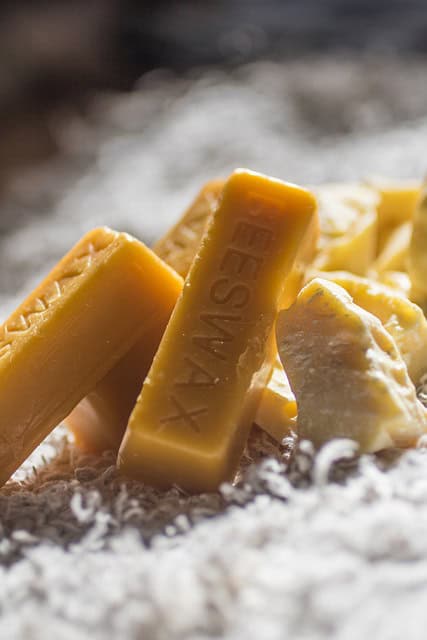
This handy little stick combines the soothing properties of coconut oil and beeswax with the cooling and anti-inflammatory benefits of lavender and peppermint essential oils, creating a portable and effective remedy for itchy mosquito bites.
What You’ll Need:
3 tablespoons coconut oil
2 tablespoons beeswax pastilles
10 drops lavender essential oil
10 drops peppermint essential oil
Empty chapstick tubes
Microwave
Instructions:
Melt the base: Combine the coconut oil and beeswax pastilles in a heat-safe bowl. Heat in the microwave in 15-second intervals, stirring well after each interval, until completely melted and smooth.
Add the essential oils: Carefully stir in the lavender and peppermint essential oils until they are well-mixed.
Pour into tubes: Carefully pour the mixture into empty chapstick tubes.
Cool and solidify: Allow the balm to cool and solidify completely.
To Use:
Apply directly to bites: Apply the balm directly to mosquito bites and gently rub it in.
Reapply as needed: You can reapply the balm as needed for continued relief.
Note: This recipe can be adjusted to your liking. You can experiment with the amount of each ingredient and the types of essential oils to find your perfect blend.
Important Considerations:
Patch test: Always do a patch test on a small area of skin before applying any DIY repellent to your entire body.
Reapply as needed: The effectiveness of these repellents may vary depending on the weather and the level of mosquito activity. Reapply as needed, especially after sweating or swimming.
Store properly: Store your DIY repellents in airtight containers in a cool, dry place.
Additional Tips for Mosquito Control:
Eliminate standing water: Mosquitoes breed in stagnant water, so make sure to empty any containers that collect water, such as flower pots, birdbaths, and buckets.
Keep your lawn trimmed: Mosquitoes prefer to hide in tall grass and overgrown vegetation.
Use mosquito netting: Cover your outdoor seating areas with mosquito netting to create a barrier against those pesky bites.
Wear light-colored clothing: Mosquitoes are attracted to dark colors, so opt for light-colored clothing when spending time outdoors.
FAQ: Your Homemade Mosquito Repellent Questions Answered
Q: How effective are homemade repellents compared to store-bought options?
A: Many homemade mosquito repellents, especially those utilizing essential oils like citronella and lemongrass, have demonstrated effectiveness in repelling mosquitoes. However, their effectiveness can vary depending on factors such as the concentration of active ingredients, individual sensitivities, and environmental conditions. It’s important to note that homemade repellents may not offer the same level of protection as commercially available DEET-based repellents, which are generally considered more potent.
Q: Are homemade repellents safe for children and pets?
A: Not all homemade repellents are safe for children and pets. Some essential oils, like tea tree oil and peppermint oil, can be toxic to animals. Always consult with your pediatrician or veterinarian before using any homemade repellent on children or pets. When in doubt, stick with kid- and pet-friendly options like citronella and lemongrass essential oils, and always dilute them properly.
Q: How long do homemade repellents last?
A: The duration of effectiveness for homemade repellents can vary depending on the ingredients and the method of application. Some repellents, like those containing essential oils, may provide several hours of protection, while others, like those using herbs, might need to be reapplied more frequently.
Q: What are some common ingredients used in homemade repellents?
A: Many plants and essential oils possess natural mosquito-repelling properties. Common ingredients include:
Essential Oils: Citronella, lemongrass, eucalyptus, peppermint, lavender, rosemary, tea tree oil.
Herbs: Lavender, rosemary, mint, sage, marjoram, anise hyssop, garlic.
Oils: Coconut oil, castor oil, beeswax, cocoa butter.
Q: Can I use homemade repellents in combination with other methods?
A: Absolutely! You can use homemade repellents in conjunction with other mosquito control measures, such as:
Mosquito netting: Use netting over beds, porches, or other outdoor areas.
Eliminating standing water: Mosquitoes breed in standing water, so make sure to empty any containers that collect rainwater.
Installing screens: Install screens on windows and doors to prevent mosquitoes from entering your home.
Remember: While homemade mosquito repellents can be an effective and natural way to deter mosquitoes, it’s crucial to use them responsibly and with caution. Always consult with a healthcare professional if you have any concerns about using homemade repellents, especially for children or those with sensitive skin.


